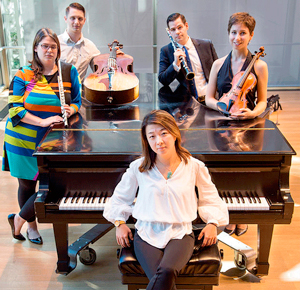by Timothy Robson

Ars Futura, an instrumental quintet directed by pianist Shuai Wang, presented an imaginative program of mostly 20th-century works (with excursions back to the 19th century and up to the 21st century) that demonstrated that modern music isn’t all scary, but can be entertaining, melodic and even funny, with recognizable tunes. Besides Wang, the other members are Madeline Lucas, flute, Drew Sullivan, clarinet, Tara Lynn Ramsey, violin, and Sophie Benn, cello.
Igor Stravinsky’s L’histoire du soldat (The Soldier’s Tale, 1918/19) is about a young soldier who sells his violin to the devil in exchange for a book that predicts the future economy. Originally a theater piece for actors and large chamber ensemble, Stravinsky later extracted and arranged a suite of music for violin, clarinet and piano. The music is witty, ironic, and parodistic of the popular music of the day. Among other styles, we hear tango, ragtime, and waltz. As in much of Stravinsky’s music, rhythm is paramount, with seemingly straightforward meter constantly interrupted. The instrumental texture is often light but jittery. Ars Futura captured the essence of the five movements; however, there were some issues with the ensemble balance. At times the violin was lost in the texture and the piano and clarinet overpowered the others.
Norwegian composer and violinist Johann Halvorsen (1864-1935) had the misfortune of being in the looming shadow of his contemporary Edvard Grieg, and although Halvorsen composed an extensive catalog of symphonic, chamber and incidental music, he is now neglected. One of his more well-known works is the Passacaglia in G minor on a theme by G.F. Handel (1897). The theme is from Handel’s Harpsichord Suite in G minor, HWV 432; Halvorsen originally composed it for violin and viola. Here, Tara Lyn Ramsey and Sophie Benn substituted the cello for the viola. One could only admire the brilliant technical prowess of the two players with the myriad challenges the composer presented to them. The variations were a virtuoso showpiece, yet it was the musical equivalent of cotton candy: lots of fluff and not much substance. For this work the duo moved from the Pilgrim Church floor level up to the preaching platform where they had a solid, resonant wall reflecting the sound out into the auditorium. The improvement in the clarity of the sound was remarkable. Other small performing groups (not requiring piano, which, alas, is on the floor) should experiment with that arrangement.
David Lang (b. 1957) has achieved acclaim in recent years, particularly for his Pulitzer Prize-winning 2008 Little Match Girl Passion, an austere work inspired by Bach’s passion settings and based on the Hans Christian Andersen story. Lang’s 1999 Sweet Air finds the composer in a much more amiable mood. The title comes from a term that a dentist used for “laughing gas” while treating Lang’s son. Sweet Air is structured in a series of contrasting strophes, with a brief coda. The prevailing mood is hazy, or, perhaps more appropriately, vaporous — diatonic and minimalist in musical style. The tonality alternates between “major” and “minor,” although the terms are used advisedly – sometimes the tonality is itself a bit hazy. The dynamic is quiet throughout, although it’s an intensely happy quiet, just like the “sweet air” itself. The whole ensemble played the piece in an entirely convincing performance. The balance problems in the Stravinsky were not present here.
American composer Joan Tower’s Petroushkates (1980) is a witty mash-up of music from Stravinsky’s Petroushka and the idea of figure skating music. What at first listen appear to be excerpts directly from Petroushka immediately morph into wild escapades. I was reminded at several points of the instrumental textures in Messiaen’s Quartet for the End of Time. It was brilliant fun.
The closing work on the program was a 2004 suite by John Harbison (b. 1938) called Songs America Loves to Sing. The ten movements are all based on very familiar American hymns, popular songs, gospel songs, jazz and blues numbers. The tunes may be familiar (and recognizable), but the melodies are subjected to complex contrapuntal techniques which owe their debt to — among others — J.S. Bach’s Goldberg Variations and early contrapuntal works of the 15th century. The compositional techniques may have been complicated, but one’s awareness of them, or lack thereof, did not diminish the enjoyment of the movements. Two of my favorite movements were the glosses on the gospel hymn “What a Friend We Have in Jesus,” and the political song “We Shall Overcome,” which might have been written by Dufay. The last movement is a melancholy and nostalgic setting of the “Anniversary Song” (aka “Happy Birthday to You.”) It was a splendid closing to an entertaining program. Ars Futura shows great promise and is worth catching at some future performance.
Published on ClevelandClassical.com October 1, 2014.
Click here for a printable copy of this article.



